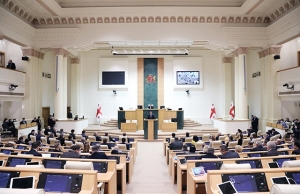Weekly Political Developments
This week turned out to be full of interesting political developments in the Georgian reality, with a lot of important events taking place simultaneously.
On Tuesday, the annual meeting engaging heads of overseas diplomatic missions of Georgia, labeled as the 'Conference of Ambassadors 2020 – Foreign Policy Priorities of Georgia within the Global Pandemic, New Challenges and Opportunities,' was held in an online format.
At the event, Georgian Prime Minister Giorgi Gakharia praised the involvement of the US and EU ambassadors in the political dialogue between the government and the opposition, aimed at reducing polarization between the sides.
“Naturally, when the process directly engages the ambassadors of our strategic partners, the EU and US, it clearly demonstrates to our citizens that the democratic process to them, our partners. It is yet another manifestation of the results achieved in recent years. US and EU support to Georgia is higher than ever before, and we need to do our best to maintain this level of backing,” he said.
Further, the PM stressed that the territorial integrity of the country will remain the priority of the highest degree in any conditions of life in the future.
“We need to understand that it is the main challenge of our country. Hard work, policy-making, de-occupation and the territorial integrity of our country will be our top priorities in any condition of life. We need to do our best to let nobody forget our number one challenge: the occupation and territorial integrity of Georgia,” he noted.
On Wednesday, the PM presented the government program for 2021-2024 at a meeting with the parliamentary faction of the Georgian Dream. He pointed out that the government program will be aimed at enabling the country to quickly recover its economy and return to the starting position of 2019-2020.
Gakharia noted the global pandemic has seriously challenged each public institution, and everyone should "understand that this process will not end soon."
He also noted that during an economic crisis, the key goal of government is to ensure fiscal consolidation and discipline. He added that, in terms of capital expenditures, the level and magnitude will be maintained in the coming four years, irrespective of the economic crisis, as it is essential for streamlining the systemic infrastructure of the country.
The same day, a bill envisaging the abolition of budget funding for boycotting parties and the termination of free airtime was adopted in the first reading at Parliament, amending the Law on Political Unions of Citizens with 84 votes. They also voted on the planned changes to the election legislation and the Rules of Procedure of Parliament.
Following this move, the European People's Party (EPP) said on Twitter that the legislative initiative of the ruling party of Georgia is directed against the biggest opposition party, which is supported by one-third of the Georgian population (the United National Movement - UNM).
“EPP is deeply concerned by the recent legislative initiative of the ruling party of Georgia, directed against the biggest opposition party that is supported by one-third of the Georgian population.
“We urge Georgia to continue moving towards its declared EU values, and instead of restricting the democratic right of the opposition to return to constructive dialogue, to find a compromise solution which would benefit all Georgian citizens,” the EPP stated.
Following the statement, the ruling party responded that the decision to send the draft law on state funding to the Venice Commission is proof that the government is acting under democratic principles.
“The EPP should have instead called on its associated member parties in Georgia to engage in parliamentary work,” Nikoloz Samkharadze, Chairman of the Parliamentary Foreign Affairs Committee, commented.
On Thursday, the US Ambassador to Georgia, Kelly Degnan, urged the opposition to fight in parliament despite institutional shortcomings.
She says she now sees a chance to finally resolve the problems raised by representatives of the ODIHR and other observer organizations, and, therefore, calls on the opposition to enter parliament and use a democratic format.
"But it requires all members to come to parliament and fight for change within the institutions they have created and built. We call on them, no matter what shortcomings these institutions have; no matter how weak they are in the eyes of the opposition: this is a democratic format that took Georgia 20 years to build. That's why we want to use it to make the system better,” the Ambassador said.
On Thursday, Georgian parliament gave a confidence vote to PM Giorgi Gakharia’s Cabinet and governmental program 'Building of a European State' at an extraordinary session.
The Prime Minister informed the deputies about the government program in a session attended only by members of the Georgian Dream faction.
The only new member of the Cabinet of Ministers is the Minister of Justice. Giorgi Gakharia has nominated Gocha Lortkipanidze for the post.
In parallel with the extraordinary session, civil activists held a rally at the entrance of the parliament building, claiming that the current parliament is illegitimate. They say they intend to continue rallies regularly in future.
Despite several calls from the US and EU Ambassadors, opposition parties are not going to change their decision and enter the Parliament of the 10th convocation. Through this move, they express protest, believing that the incumbent government rigged the October 31 election results.
By Ana Dumbadze












